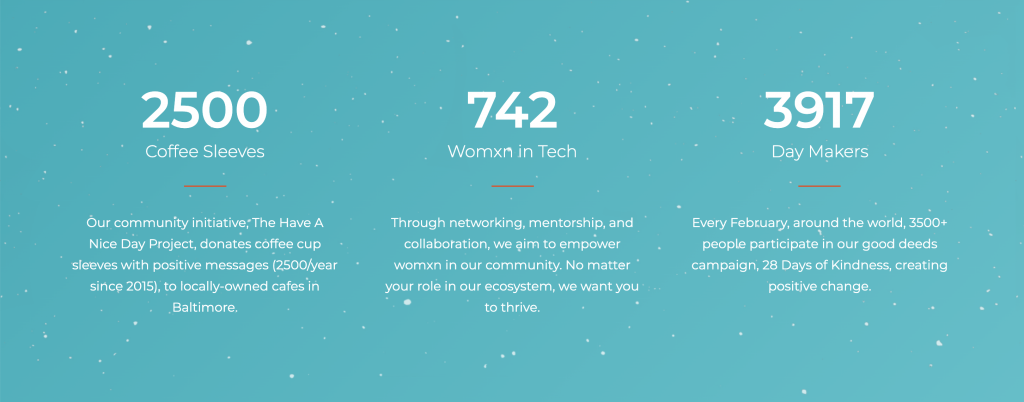We’ve learned so much about community involvement, we had to split our lessons into two posts. In our first article, we talked about starting small, doing research to see what’s already happening in your community, and tying your work back to your why. One of our main core values is that we rise by lifting others. Points North is a business made up of humans (and occasionally a furry pet or two). It takes a village, and if we’re thriving, we want our communities to thrive too. We’re based in Baltimore, and we care about our community. Period.
To us, civic engagement is any individual or group activity addressing issues of public concern. Civic engagement includes communities working together or individuals working alone to protect public values or make a change in a community. It’s the role you play in creating the world you want to live in. Here’s part two of our series on doing work in our community.
Lesson Five: Learn From Your Mistakes
So I mentioned earlier that we’re a business made up of humans. This means we’re going to make mistakes and that’s okay. There’s a wonderful game in Improv where if you fail at the activity, you have to go into the center of the circle and dramatically exclaim “I failed!” Immediately, the other members of the class will respond “you failed!” and celebrate you. And it feels so good to shout out “I failed,” to accept that as a natural part of the process. We live in a world where we’re often not given room to fail. But, it is the experience of failure that helps us find success.
Why This is Important:
- Some projects will be more time than you anticipated. You’re going to have a great idea. Then as you work to pull it off, you’ll find that it’s eating away at time you didn’t have. Maybe you didn’t think you’d have to choose between finishing a community project and going out with your friends or your turn to take the kids to soccer.
- Some projects will demand more resources than you considered. And by resources, I mean money. I can confirm that we’ve had projects go over budget, and have had unexpected expenses creep into the picture.
- Not every project you do will be convenient. And really, you shouldn’t expect this at all, especially not in the beginning. Convenience comes after you’ve had experience. Convenience comes from knowing what to expect over time, and creating a rhythm for the work.
Lesson Six: You Are Not Alone
You are not alone in this work. And you don’t have to create a new project to do civic engagement. You can support existing work in your community and tap into the energy of what’s already happening. As a bonus, some of the best networking and connections occur during the shared time in community engagement work.
Some Tips for Getting Involved
- Take a look at some of the companies that you admire. What work are they doing in their communities?
- Look into some organizations and community activities already happening where you live. Are there opportunities to support and get involved?
- Are there volunteer groups that you can join? This will help you to be around like-minded people, and can also serve as a future sounding board for your own ideas.
Lesson Seven: Measure Your Impact
You have KPI’s for your team members. You have goals for your business and for your life. The same rules apply when it comes to the impact you want to make in your communities. It’s important to add qualifiers to this work as you would one of your product or service silos with your business. Articulating the importance and milestones of this work should roll off your tongue as naturally as you can recite your elevator pitch.
Tips for Measuring Success
- Define success on your terms. There is no competition here. It’s significant to have reasonable expectations and goals, and those goals can change as your project grows and takes shape.
- The measurements should be straight to the point, but they can also reflect your personality. They don’t have to be rigid. For example, with the Have A Nice Day Project, one of our measurements is the number of coffee cup sleeves that have been donated.
- These numbers may start off small, and that’s okay. It’s going to be something special to watch these numbers grow over time. Think of it as the snowball effect. A snowball starts off small and can fit into the palm of your hand, but when traveling down a snowy hill, it picks up in both momentum and size.
- We measure our impact and talk about our work directly on our website. It’s also noted in our capabilities brochure and makes its way into our proposals when we’re introducing ourselves or relating to a mission-driven client.
Lesson Eight: Have A Contingency Plan
Most of us are really great at beginnings, but we fail to account for how we want things to end. It’s the reason why some show series and movies continue to have sequels long after they should. And I can speak from personal experience in saying it’s the reason why we have more projects than we can handle right now. Yes, more is not always better. We have to do the grunt work on this end to reevaluate some of the projects we started years ago and decide what to do with them. Sunsetting a project doesn’t equal failure, and it’s naive to think that your project will go on forever. Taking time to figure out a contingency plan for your community work can save you from having dormant projects that you don’t have time to keep running.
Questions to Help With Your Plan
- What are the long-term goals for this project? (Can you break this into 1, 3, and 5-year goals as you would for any business endeavor)
- For this project, is bigger always better? If this project gets bigger, how will you manage the growth?
- How are we defining success for this project? Do you want it to get bigger and in so what ways? Or is it something slow and steady that wins the race?
In Conclusion
Muhammad Ali once said, “Service to others is the rent you pay for your room here on earth.” And that’s true. For us, service is a natural way for us to give back to our community, in the spirit of “it takes a village.” We hope that overtime, our community work inspires the next generation of entrepreneurs, business owners, creatives, and civic leaders.



